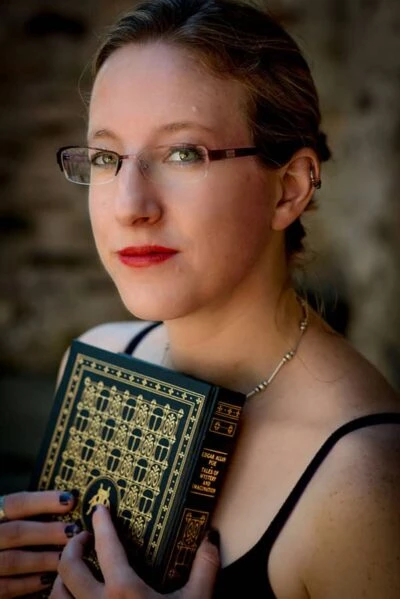
"October Country...that country where it is always turning late in the year [...] That country whose people are autumn people, thinking only autumn thoughts."—Ray Bradbury, The October Country
October is a fundamentally lonely month. Appropriately enough for the season, this month's reviews focus on stories of loneliness and isolation, but stories that offer hope as well.
"The Whalebone Parrot" by Darcie Little Badger in October's issue of The Dark opens with Emily traveling to an islandto help care for her pregnant sister, Loretta. Loretta's husband, Albert, is an Englishman who married Loretta in spite of his father's anti-Indian sentiments, and who currently looks after the island's lighthouse. While they aren't sisters by blood, Loretta and Emily are as good as sisters, raised in an orphanage where they weren't allowed to speak their first tongue and were Anglicized. Albert happily accepts Emily into the family, gifting her with a kitten on her arrival, and asking her to think of him as a big brother. Shortly after arriving, Emily also meets the island's parrot, which eerily sings bits of sea shanties and nursery rhymes, and occasionally giggles outside the window.
"Speak, sing, and whistle. I once heard it bellow like a foghorn." He rubbed his sharp, clean-shaven chin. "We think it came from a shipwreck. There were several before the lighthouse. However, nobody truly knows. It's quite mysterious."
Loretta finds the parrot dead one day, seemingly killed by Emily's cat. They bury the bird, but Loretta begins exhibiting strange behavior, suffering fits where she doesn't recognize Emily, repeating words and phrases and bits of song, and retaining no memory of her actions. There's a gothic sensibility to the story, in the haunting and in the remote setting. Emily and Loretta are doubly isolated—physically cut off from the mainland and set apart by their race—and the haunting exploits this, dividing them from each other as each other's sole family and link to their heritage. While crows, owls, and ravens are frequently associated with the supernatural and the gothic, the use of a parrot here feels fresh and unique, and Loretta's seeming possession by it is effectively done. The story works on the level of a pure ghost story, atmospheric and unsettling, but it has a larger commentary to make on racism and othering as well.
"Fandom for Robots" by Vina Jie-Min Prasad from the September/October Issue of Uncanny is opposite in tone from "The Whalebone Parrot," but shares themes of loneliness and found family, giving it a bittersweet feel.
Computron was built in the 1950s, and now resides at a technology museum, regularly performing in a Then & Now tech show. During one of the shows, an audience member poses an unexpected question—has he ever seen the anime HyperWarp? It features a robot character named Cyro who greatly resembles Computron. Even though he has no emotion circuits and cannot love or hate the show, he watches out of curiosity and quickly becomes a superfan, hanging out on forums, reading fanfic, and even writing fanfic of his own. The story is utterly charming, a love letter to fandom, while also touching on friendship, community born out of shared enthusiasm, and the idea of obsolescence. Computron feels himself becoming obsolete, but to paraphrase the classic New Yorker cartoon—no one knows you're a robot on the internet. Fandom becomes Computron's way to reconnect with the world and break out of his isolation, providing a space where he's valued for his expertise and can share his passion, rather than being seen as out of date tech. Despite the touches of sadness, it's a lovely and uplifting story, a perfect antidote to the barrage of depressing news.
"The Ouroboros Bakery" by Octavia Cade in the Autumn issue of Kaleidotrope explores a different kind of loneliness, one running just beneath the surface of the story.
Oksana is guild certified baker, her arms inked with beautiful, multi-colored scales, one for each recipe she has perfected. However there is one recipe not recognized with a scale, one that confers immortality.
Oksana carefully slices off the top of each cupcake. She fills them with crème pâtissière and redcurrant jelly. The redcurrants have been soaked in port, and the jelly is the color of jewels and blood.
Loving descriptions of food preparations are paired with equally loving scenes of food consumption as Oksana meets with former clients. There is unease in these meetings, a common sentiment that immortality is not what the clients expected it to be. These conversations build a picture of immortality's loneliness—lovers, family, and friends outlived, life's savorfaded without its opposite. However, one client, a scientist, wants to understand the roots of Oksana's magic, and maybe even replicate it, and inserts herself into Oksana's life, becoming her apprentice. Thestory shares similarities with "We Laugh in Its Face" by Barbara L.W Myers, reviewed in August's Words for Thought, though Oksana's clients have a less violent reaction to disappointment. The story is gorgeously and deliciously told, and Oksana's passion for her art comes through with every word. It's a lovely reflection on different types of loneliness, and different ways of coping with it as well.
"Airswimming" by Aisha Phoenix, published at Strange Horizons in October, is a story about the isolation of grief and the many complicated forms it can take.
Imani and her mother visit Imani's grandfather, finding his mental state in decline. He invites strangers and stray dogs into his house, but talks about sending the dogs to heaven while digging graves for them.Shortly after they return home, one of the strangers murders and robs Imani's grandfather. While Imani only has fond memories of her grandfather, Imani's mother reveals the abuse she was subject to as a child. Imani loses her appetite at this news, and when it doesn't return, her mother insists she attend a retreat for people grieving victims of violence. At first the retreat seems straightforward, promoting exercise, healthy eating, and discussing feelings. Then one of the counselors reveals the real purpose of the retreat, teaching the campers how to float and swim through air. While the others practice and improve, Imani finds herself unable to even leave the ground. Another camper, Fei, is also unable to airswim, and reveals to Imani that she feels unable to mourn the mother who failed to protect her from abuse as a child.
While the subject matter is hard, the story is fullof beautiful descriptions and imagery. There is something magical about the idea of literally floating away from grief. Of course, Phoenix reminds readers that things aren't always that simple. Everyone'sgrieving process is different and that can be isolating. However Fei and Imani build a community within a community, showing that sometimes all it takes is one person willing to listen.
We airswam through a faint mist and the lightest drops of rain, which glistened like jewels on the foliage. We glided above a carpet of ferns, up past the banana palms, and into the trees with their vines like locks of hair. Through layers of green we rose, wet leaves brushing against our skin. We disturbed a lizard, which darted away, and a pair of hornbills that disappeared in a flurry of black and white, and continued rising until we broke through the canopy to the expansive sky above.
"Belong to Me" by Rachel Harrison in Syntax & Salt plays on the idea of always the bridesmaid, never the bride, but with aliens.
Carolyn and Becky have been best friends since they were three. Now Carolyn is getting married, and her groom just happens to be the Martian who crash landed in her backyard during a sleepover when she and Becky were in fourth grade. The story is never twee, and Harrison infuses it with real poignancy. Carolyn is well-off, and there's a carelessness to her, but not the kind Becky can resent. Their friendship is genuine, but over the years it has fractured without breaking.
X was a complication in our friendship equation. A complication that had metastasized over the years. It had its own gravity now, its own scent. That damp, rancid smell that air gets when the weather’s about to turn.
Becky and X slept together just once. They've never told Carolyn, butduring the wedding, Becky debates whether she will. She's always been in love with X, but telling Carolyn seems unlikely to result in happiness for any of them.Harrison perfectly captures something most people feel at some point in their lives - the idea of wanting to be special, chosen, set apart from others while being part of a larger whole. It's a quiet story, the speculative touch light, and effectively explores friendship, jealousy, unrequited love, and maybe mercy, depending on how you read the ending.













